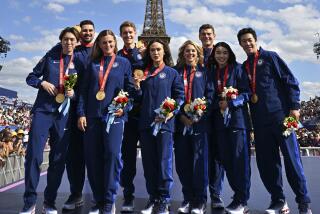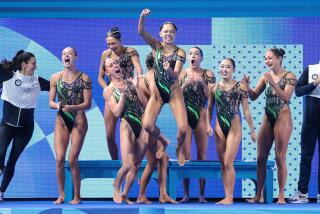For U.S., a long trek to Nordic combined medal
- Share via
Reporting from Whistler, Canada — Eight years. One minute.
Two very different measurements of time that have weighed heavily on the U.S. Nordic combined team.
Eight years ago, Todd Lodwick, Johnny Spillane and Bill Demong finished one minute off the podium in the team competition at the 2002 Salt Lake City Olympics.
“We’ve been through a lot,” Lodwick said. “We’ve been through hell.”
But on Tuesday, the trio -- with help from a new addition in Brett Camerota -- took some sting out of a painful memory, earning silver in the team 4x5-kilometer event at Whistler Olympic Park.
The sense of redemption was great enough that none of them could feel too upset about losing this combination of ski jump and cross-country relay in a thrilling finish.
Demong, the final U.S. racer, approached the stadium with the slightest of leads but was out-sprinted by Austria’s Mario Stecher.
The powerhouse Austrians repeated as Olympic champions -- perhaps making up for the failures of their Alpine team -- and Germany finished third.
But that didn’t stop the Americans from smiling, Demong explaining: “Today was much sweeter because we’ve waited so long.”
It has been a historic week for the U.S. team, which captured its first medal in Nordic combined history when Spillane took silver in the normal hill competition last week.
Coming into this four-man event, the toughest competition figured to come from Austria, Norway and Japan.
The Austrians finished third in the jumping portion thanks mainly to Bernhard Gruber’s landing what he described as “a quite good jump. I had good flying.”
The Americans were in second place after Camerota, making his Olympic debut in Vancouver, soared well past expectations.
“It’s a lot of pressure since I’m the fourth guy,” he said.
The ski-jumping results determine the staggered start for the relay race, and there were a number of teams bunched at the top. Finland went off first but quickly faded.
Camerota summoned another surprise effort, staying with the leaders, and the Germans looked threatening until Tino Edelmann fell on the second leg.
So it came down to a race between the established Austrians and a U.S. team trying to make its mark.
With snow falling harder as the day went on, it was clear the Austrians had better-prepared skis and Spillane lost valuable time to Felix Gottwald on the third leg.
Demong was able to close the gap quickly, pulling into the lead, but he knew that he would have to open some space to hold off Stecher.
Stecher knew it too, saying: “I recognized that I’m having the better skis.”
Back at the stadium, the rest of the U.S. team watched nervously. Fifteen years ago, Lodwick, Spillane and Demong had committed themselves to Nordic combined, a sport all but unknown in North America.
They had spent more than 300 days a year together, training and racing, using their off days to hunt and fish.
After the disappointment of Salt Lake City, followed by a subpar 2006 Turin Olympics, Lodwick briefly retired before rejoining his teammates for one more try in Vancouver.
From his spot near the finish line, he could see Demong and Stecher sail down a long turn that leads into the stadium. Stecher took a wide line.
“I was going the long way which was a bit faster,” he said.
“So I got a bit of an advantage.”
The final difference was 5.2 seconds. But not long after Demong crossed the line, Lodwick thought about a different span of time.
One night.
“To tell you the truth,” he said of his silver medal, “I can’t wait to go to bed with it tonight.”
twitter.com/LATimesWharton
More to Read
Go beyond the scoreboard
Get the latest on L.A.'s teams in the daily Sports Report newsletter.
You may occasionally receive promotional content from the Los Angeles Times.







